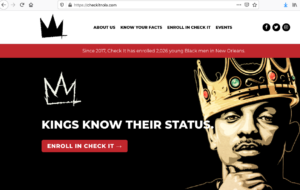
Final Reflections as an RRRH Intern
This blog post will sadly be my last one as a Reproductive Rights and Reproductive Health Intern as I am graduating with my B.S. of Public Health in May. This internship program offered me many opportunities to develop research skills that I will utilize in my future career, and I am excited to reflect on my time in the program.
Since my last blog post, Dr. Lederer and I began coding in NVivo (qualitative software program) using interview data from the Check It Program and based on our research question “What are Check It participants’ reactions to testing positive for Chlamydia (CT)?”. Our coding process started by developing a codebook for use in NVivo after a preliminary review of the interviews. Some of the preliminary codes include: relief diagnosis wasn’t anything worse, seeking information about CT after diagnosis, engaging in partner notification, chill/nonchalant, surprised/disbelief, and confusion about how they contracted CT. As we code interviews in batches of three, Dr. Lederer and I compare our codes and see if we want to make any changes to the codebook. We have been refining the codes as we code interviews and have now finalized our codebook. The qualitative coding process is very informative for understanding how themes emerge within data and the importance of dual coding is evident in our meetings as we discuss which codes we do and don’t agree on.
Dr. Lederer and I, with the input of the Check It Team, submitted an abstract to the Sexual and Reproductive Health program area of the American Public Health Association’s 2021 Annual Meeting & Expo. I took the lead on drafting the components of the abstract, Dr. Lederer and I workshopped the abstract to fit the word limit and achieve a scholarly tone, and the Check It Team provided final comments and approval. The abstract noted that CT is common and consequential, the reasoning for our priority population focus, our preliminary findings, and the objective to inform how health professionals communicate a CT diagnosis and recommendations for how study results can be used to help deliver effective and compassionate care. This was my first experience writing an abstract; I learned how to make my scholarly writing concise and comprehensive.
As I reflect on my time in the RRRH program, I realize I am now confident educating others about sexual health and reproductive rights and justice, and I have deepened my understanding of reproductive rights policy and programming in New Orleans, Louisiana, and nationally. I gained a comprehensive understanding of the research process, including conducting literature reviews, qualitative coding, and writing manuscripts. All the guest speakers I am fortunate enough to have learned from through the program remind me and my fellow interns that we are part of a network of empowered people who will not stop advocating for reproductive rights. I am most thankful for the mentorship that Alyssa Lederer and Clare Daniel have offered me. Underserved populations deserve to benefit from empirical research that informs best practices for achieving health equity, eliminating disparities in healthcare, and improving sexual health outcomes and care, and I am proud to be part of that research and advocacy.
